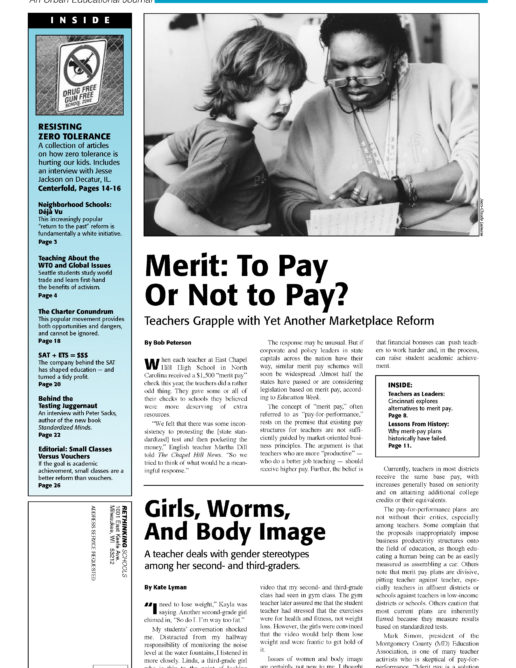Chicago’s ‘No Social Promotion’ Under Attack
By Julie Woestehoff
The Office for Civil Rights of the U.S. Department of Education agreed this November to investigate complaints that the use of the Iowa Test of Basic Skills (ITBS) to determine retention is disproportionately discriminatory against African-American and Latino students. The investigation is expected to take until April.
A month later, a report by the Consortium on Chicago School Research gave the “no social promotion policy” mixed reviews. A leading member of the consortium, meanwhile, issued a minority statement calling the Chicago program “a failure.”
Since 1997, Chicago has required third, sixth and eighth-grade students who did not meet necessary scores on the standardized test known as the ITBS to attend a “summer bridge” program and be retested at summer’s end. Most of those who again failed the tests were retained in their grade or, if they were 15, sent to “transition centers.” Under a special waiver policy, certain students were promoted even if they failed the test.
Chicago was the first major urban district to institute an extensive” no social promotion” policy, and its initiative has been lauded nationally by those who support high-stakes testing. Under the policy, about 10,000 students each year have been asked to repeat a grade.
The federal civil rights complaint was filed by Parents United for Responsible Education (PURE), a parent advocacy group, and individual parents of Chicago students. The suit alleges that the district’s use of ITBS test scores as sole measures to determine student promotion and retention violates federal legal and civil rights laws and principles. PURE also alleges that application of the district’s waiver policy, under which some students are promoted even if they do not pass the ITBS, is arbitrary and discriminatory.
PURE found that the enrollment of African-American and Latino students in transition centers is disproportionately high compared with their enrollment in the general school population, indicating a discriminatory effect of the district’s policy. PURE also cited a 1999 study by the National Research Council and the new guidelines from the U.S. Department of Education, both of which raise questions about the quality and equity of the Chicago program.
PURE is asking that the district revise its promotion policy so that students will be evaluated on multiple measures of learning, not on a single standardized test. It also asks that the revised policy include a clearly-written, standard waiver provision which will be applied in a fair, non-discriminatory manner and will include due process.
REPORT GIVES MIXED REVIEWS
In December, meanwhile, the Consortium on Chicago School Research released its first report on the effects of the no social promotion policy on student achievement and school instruction. The Consortium is an independent federation of Chicago area organizations that conducts research on issues related to Chicago’s public schools.
The report indicated that retained students continue to achieve extremely poorly on the Iowa Test, even after a summer school intensively focused on test-taking and after repeating a grade during the regular school year. “While summer bridge raised students’ performance briefly, there is no evidence that it altered the overall pattern of school-year achievement for these students, “the report said.
The report, however, also found significant increases in the proportion of students who meet the test-score cutoff for promotions.
The report gave mixed results on whether getting students to meet the minimum score allows them to do better the next year; and it noted the uneven access across schools to policy waivers.
In a minority report released concurrently, Consortium Steering Committee member Donald Moore argued that both the retention policy and the social promotion policy it replaced are failures. He called for alternatives for improving student achievement in urban schools that are based on research. In particular, he cited high-quality early childhood education, preparing elementary school teachers to teach reading more effectively, and consciously spreading the practices of high-achieving inner-city schools to other schools.
Moore, executive director of the Chicago education advocacy group Designs for Change, released figures showing that African-American students were four-and-a-half times more likely to be retained than white students, and Latino students were nearly three times more likely to be retained than white students.
![]()
![]()

